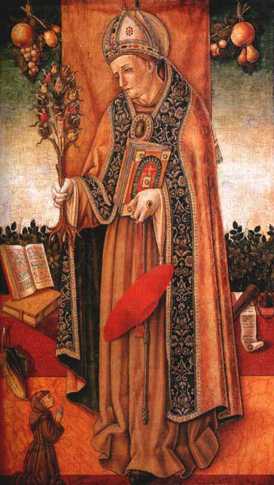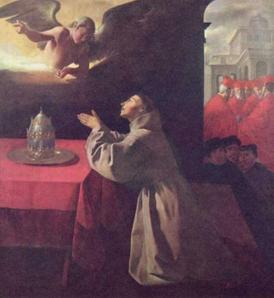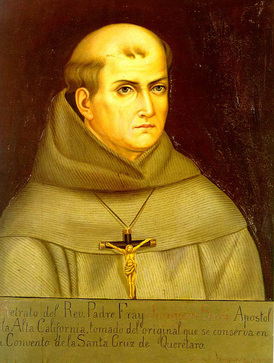 "As for yourself, be self-possessed in all circumstances.... I am already being poured out like a libation." --From the Second Letter of Paul to Timothy, and from the Gospel of Matthew.
"As for yourself, be self-possessed in all circumstances.... I am already being poured out like a libation." --From the Second Letter of Paul to Timothy, and from the Gospel of Matthew.When the papal legates came to the Franciscan convent, bearing the cardinal's red hat of the see of Albano, they found Brother Bonaventure doing the dishes outside. In dishwater up to his elbows, the story goes, he pointed to the branch of a nearby tree and said, "Hang it there." Self-possession is all right up to a point. Myself, I'd have poured out that magic detergent as a libation, and have made a dive for the "merited crown reserved for me."
Saint Bonaventure had reason to be self-possessed. He was the general of the Franciscans at thirty-nine and curial cardinal a year before he died at fifty-nine. Just a year or so before this, his friend Aquinas had refused the archbishopric of Naples. And Saint Albert the Great, Aquinas' teacher in Cologne, died as the Archbishop of Regensberg.
All three men I've named were later designated doctors of the Church and all three were mendicant friars. Is there any realtion between their state in life and the theological eminence --or even their office as teachers of the least of the commandments? The answer, I think, is yes and no. The first concern of the early friars was not intellectual. It was to break out of the mold of static institutions which were impeding the spread of the Gospel. Monasticism meant hugh landholding --a princedom for the abbot-- as witness Monte Cassino where Saint Thomas did his grammar and high school. The parish clergy were illiterate. The monks who could read and preach were immobile. Francis, Dominic, the varying reform-fashioners of the Augustinians, the Carmelites, the Gilbertines, all decided to "get the Church moving." They brought the monastery into the marketplace; they preached sermons in the streets to octogenarians who had never heard a sermon before. They even invaded the new universities --already the preserve of the secular clergy. They were poor men, and let the light of their goodness and dedication shine. They became students perforce because the great charity which men of that time needed to have shown them was broken bread of God's word in all its purity and strength,
What the worker priests, the little brothers and sisters of Charles de Foucauld, lay missionaries and secular institutes are in our day, mendicant friars were in theirs. All human institutions, groupings excluding the family, tend to outlive their usefulness and die. That could include today's relgious orders as we know them. New needs arise. But some things are constant: charity, stability, chastity, wisdom, obedience, utter fidelity to the Master's message.
Gerard Sloyan
Homily, NOYP, 197-99



